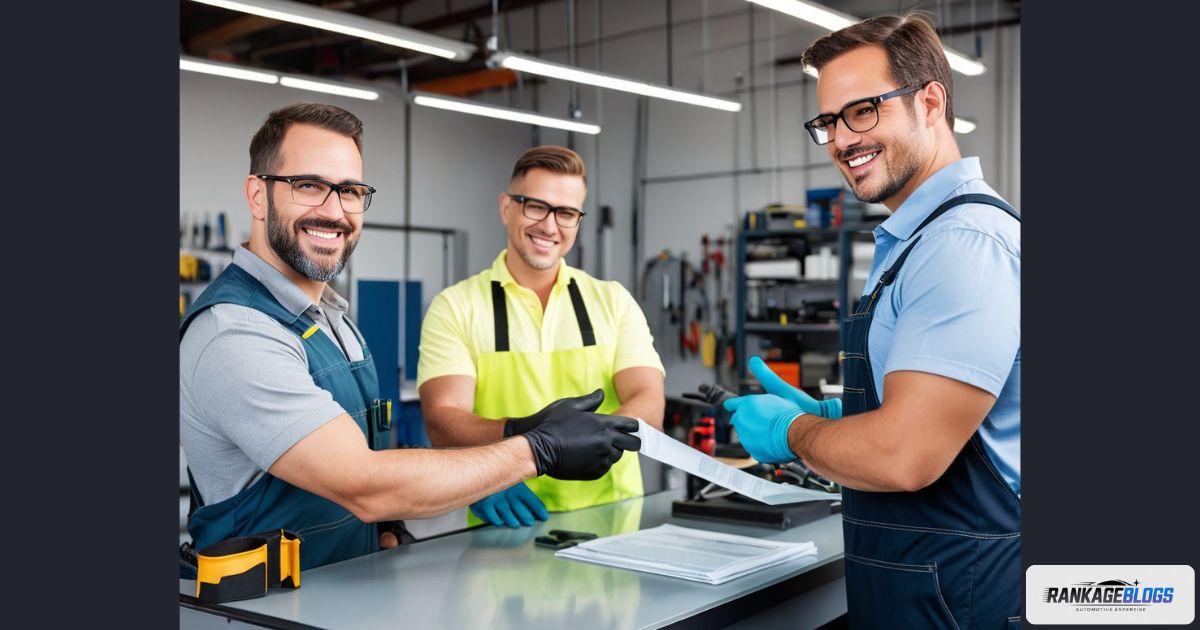Starting an auto glass shop business in the USA requires more than just technical skills—it demands a deep understanding of critical auto glass shop business regulations, safety laws, and compliance standards. Regulations are not just red tape; they ensure consumer protection, safeguard technicians, and build long-term trust with insurance providers. From federal safety codes to state-specific rules, every regulation shapes how your shop operates and competes.
Failing to follow these auto glass shop business regulations can lead to heavy fines, lawsuits, or even closure. This guide simplifies complex legal requirements, helping shop owners turn compliance into a competitive advantage while protecting customers, employees, and the future of their business.
Why Regulations Matter for Auto Glass Shops
For an auto glass shop, regulations are far more than bureaucratic red tape—they form the foundation of your operation’s safety, legality, and reputation. Ignoring them isn’t just a risk—it’s a direct threat to your business survival. A single non-compliance issue can lead to massive fines, civil lawsuits from injured customers, or a complete license suspension that shuts your doors permanently.
Beyond avoiding penalties, a strong compliance record is your most powerful marketing tool. Insurance companies, which drive a significant portion of industry revenue, will only partner with shops that demonstrably follow all legal requirements for auto glass shops. Similarly, fleet managers and discerning customers actively seek out businesses that prioritize safety and professionalism, giving you a clear edge in a competitive market.
Key Compliance Areas
For any auto glass shop, mastering these three core compliance areas are essential for legal operation, customer safety, and long-term business success.
Protecting Customers & Safety Standards
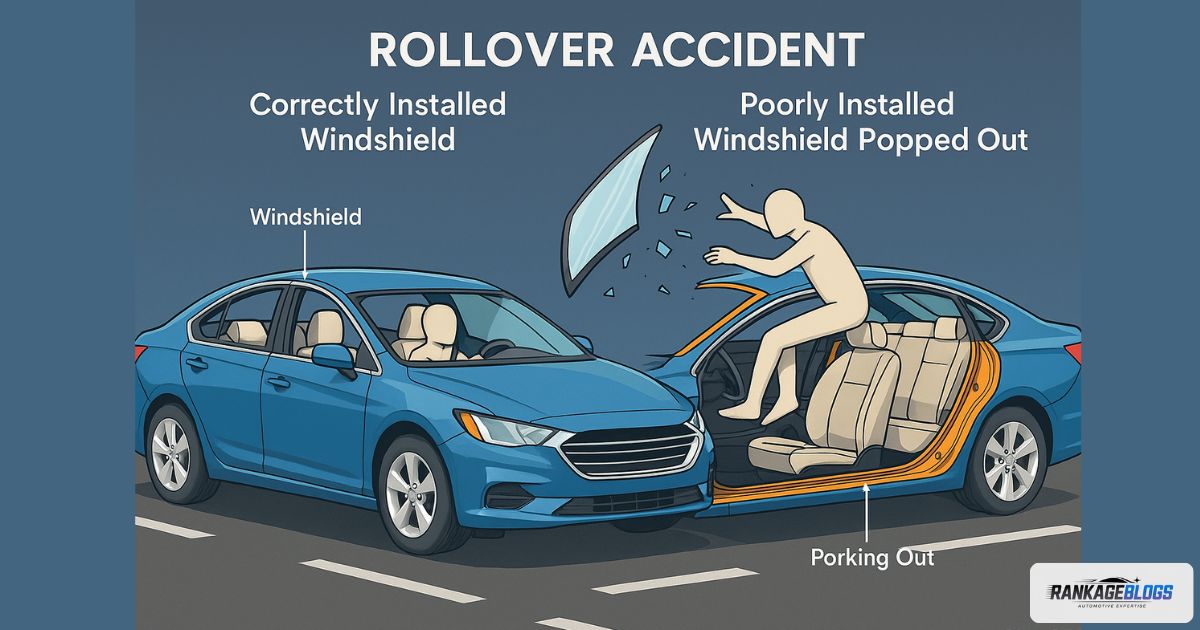
Your primary legal and ethical duty is to ensure that every vehicle leaving your shop is safe for the road. This means using certified materials and proper installation techniques that maintain the windshield’s role as a critical structural component, especially during a collision.
🧩 PROBLEM: A windshield that is not installed to the manufacturer’s specifications or with substandard materials can pop out during a rollover accident or cause the airbag to deploy incorrectly, leading to severe passenger injury or death.
✅ SOLUTION: Adhere strictly to the Auto Glass Replacement Safety Standard (AGRSS) and ensure every technician is trained in the latest professional installation standards. This commitment to quality is your first and best defense against liability.
Avoiding Fines, Lawsuits, and Shutdowns
State authorities regularly conduct inspections. Failure to meet standards can result in escalating penalties for non-compliance, from hefty fines to a complete business closure. Furthermore, improper work exposes you to devastating liability lawsuits.
🧩 PROBLEM: An unlicensed competitor undercuts your prices, but you’re considering cutting corners on a surety bond to compete. This is a catastrophic risk.
✅ SOLUTION: Operate with 100% transparency. Your license and bond are public declarations of your legitimacy. They are the cost of doing business and protect you from unscrupulous competitors who will eventually be shut down.
Building Trust with Insurance Companies & Fleets
Insurance carriers require proof of proper licensing and insurance before adding a shop to their Direct Repair Program (DRP) network. This partnership is a key source of steady work and revenue.
🧩 PROBLEM: You’re struggling to get steady work because you’re not on any insurance DRP lists.
✅ SOLUTION: Build a compliance portfolio. Proactively present your state license, surety bond, and commercial general liability insurance certificates to insurance regional managers. This demonstrates you are a low-risk, professional partner.
Federal Regulations for Auto Glass Businesses
At the federal level, several agencies set the baseline legal requirements for auto glass shops that every business must follow, regardless of location. These regulations are non-negotiable and focus on product safety, worker protection, and fair trade. Understanding these will form the bedrock of your auto glass business compliance strategy and ensure your shop meets the highest national standards.
The most critical rules come from the National Highway Traffic Safety Administration (NHTSA) and the Occupational Safety and Health Administration (OSHA). Adherence to these federal vehicle repair laws is not just about avoiding fines—it’s about ensuring the fundamental safety of the vehicles you repair and creating a safe working environment for your technicians.
National Highway Traffic Safety Administration (NHTSA) Standards
The NHTSA enforces Federal Motor Vehicle Safety Standards (FMVSS 205), which govern the quality and safety of automotive glass. All glass you install must be certified as AS-1, AS-2, or AS-3, indicating its optical quality and safety properties according to FMVSS standards for new windshield technologies. Adherence to these NHTSA auto glass safety standards is mandatory for all USA automotive repair laws governing vehicle safety systems.
Problem: Installing non-certified or counterfeit glass voids vehicle safety, compromises structural integrity, and exposes you to massive liability in the event of an accident.
Solution: Source glass only from reputable distributors. Before installation, verify the DOT-approved glass marking on every windshield. Take a photo of this marking and include it in the customer’s digital job file. This simple step provides irrefutable proof of compliance and due diligence.
Department of Transportation (DOT) Safety Markings & Glass Requirements
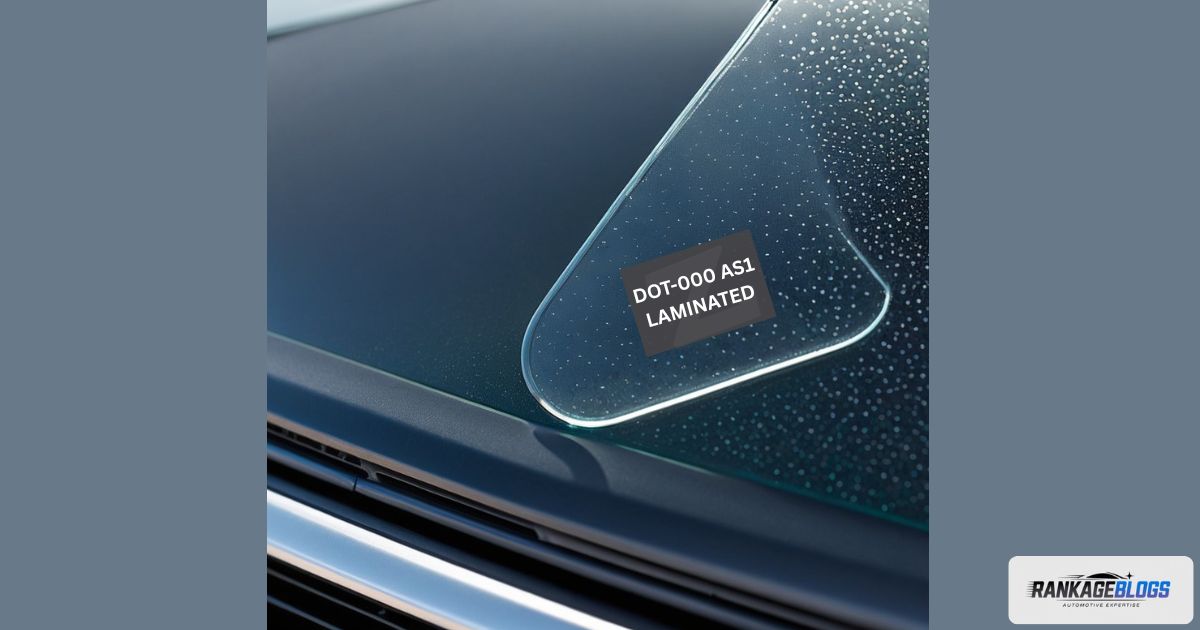
Every piece of automotive glass must have a DOT-approved marking etched into it, which includes the manufacturer’s unique identifier. Using glass without this certification is illegal. You must be able to trace every piece of glass you install back to its certified source — a key part of your record-keeping compliance.
OSHA Guidelines for Worker Safety
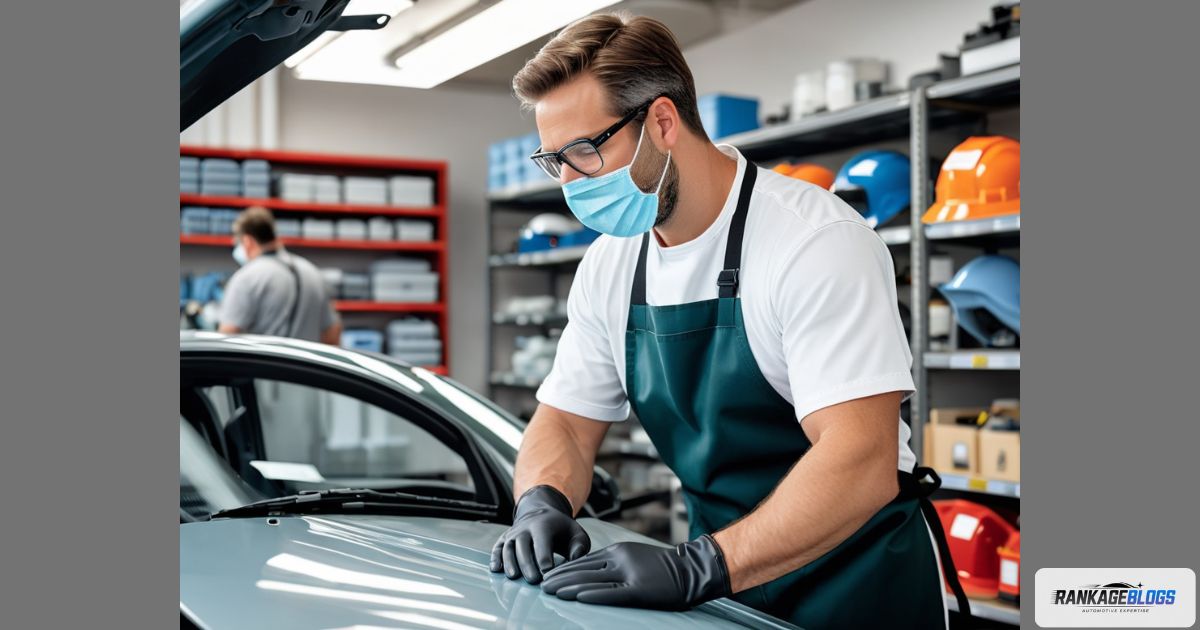
OSHA sets the standards for a safe workshop. This includes rules for handling sharp glass edges, proper ventilation for chemical fumes from adhesives and cleaners, the use of personal protective equipment (PPE) like gloves and safety glasses, and protocols for safely lifting and moving heavy windshields to mitigate health and safety hazards for technicians.
Problem: A technician suffers a deep laceration from handling glass without cut-resistant gloves, leading to a costly workers’ compensation claim and lost productivity.
Solution: Implement and enforce a strict PPE policy. Conduct weekly safety briefings. Maintain a log of all safety training and equipment inspections. This proactive approach to OSHA workplace safety for glass technicians protects your team and your business’s financial health.
State-Level Auto Glass Shop Business Regulations & Licensing
While federal laws set a national baseline, the day-to-day legal requirements for auto glass shops are primarily dictated by state governments. This is why the process of registering auto glass shop operations varies significantly across the country. For a detailed, step-by-step walkthrough of the application process in any state, see our guide on how to get an auto glass business license.
You must contact your specific state’s Department of Business or Professional Regulation to get the exact details for your location, as assuming rules are the same can be a costly mistake. These state-specific licensing requirements exist to protect local consumers and ensure a minimum standard of quality and financial responsibility. The process might seem daunting, but it’s a structured path to legitimacy. For example, someone asking “What licenses do I need for an auto glass shop?” in California is dealing with a different agency and set of rules than someone starting a mobile auto glass business in Texas.
Your 5-Step Checklist for State Licensing (Any State)
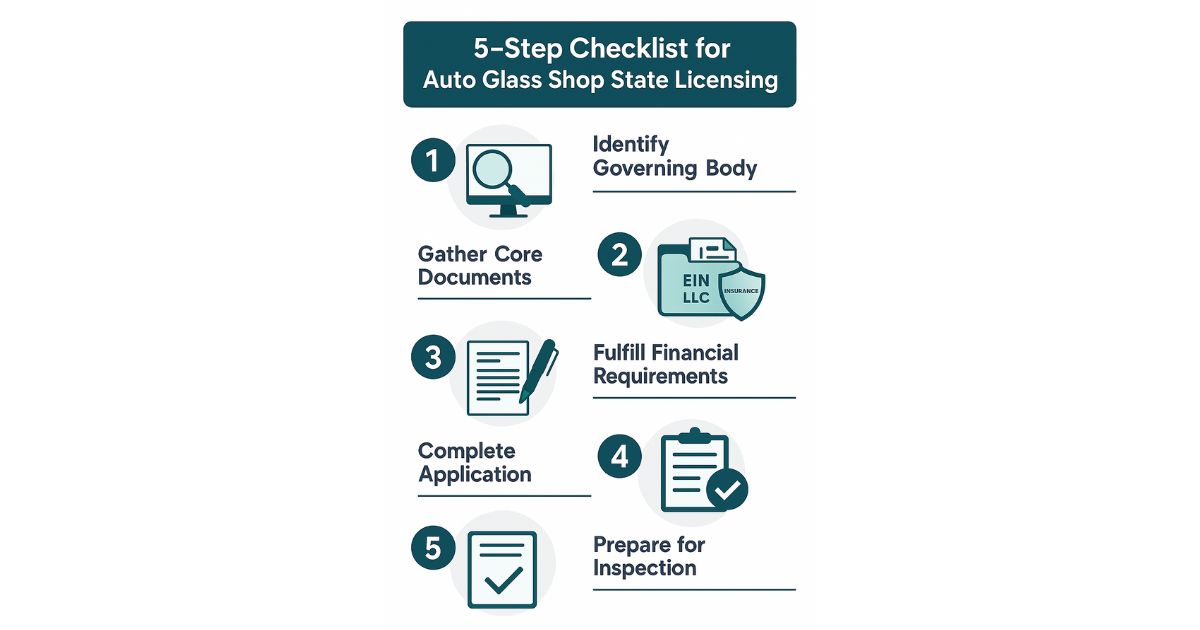
- Identify Your Governing Body:Search online for “[Your State] auto glass repair license” or “[Your State] Department of Business Regulation.” This is your primary source of truth.
- Gather Core Documents:
- Prepare your EIN:Obtain your Employer Identification Number (EIN) for free from the IRS online. You will need this for your state business registration and to open a business bank account.
- Finalize your Business Formation Papers: Have your formation documents (like Articles of Organization for an LLC) ready. Preparing these is a key part of formally establishing the Business Structure (e.g., an LLC or sole proprietorship) you have chosen.
- Collect Personal Identification: Gather personal ID for all owners, such as driver’s licenses or passports.
- Fulfill Financial Requirements:Understand your auto glass shop bond requirements and apply for your surety bond. Obtain proof of commercial general liability insurance. The required bond amount varies by state.
- Complete Application & Pay Fees:Fill out all state forms meticulously. Be prepared for the cost of damage repair shop license fees. Any errors will cause delays. Pay all required licensing and application fees.
- Prepare For Inspection:Ensure your shop meets all OSHA workplace safety and local zoning laws before the state inspector arrives. Have all your record-keeping systems ready for review.
Why State Rules Vary Across the USA
Each state has its own legal framework governing contracting and consumer protection. Some states have specific “Auto Glass Repair and Replacement” licenses, while others classify the work under a general “Motor Vehicle Repair” license or a contractor license for auto glass shops. Population density, climate, and local industry lobbying also influence the strictness of regulations.
Typical Requirements: Business License, Contractor License, Surety Bond, Environmental Permit
Most states will require a general business license, a specific contractor license for auto glass shops, and a surety bond — a financial guarantee that protects your customers. You may also need a local zoning permit and an environmental compliance permit for the disposal of hazardous materials like old urethane.
Example of Differences between 2–3 States
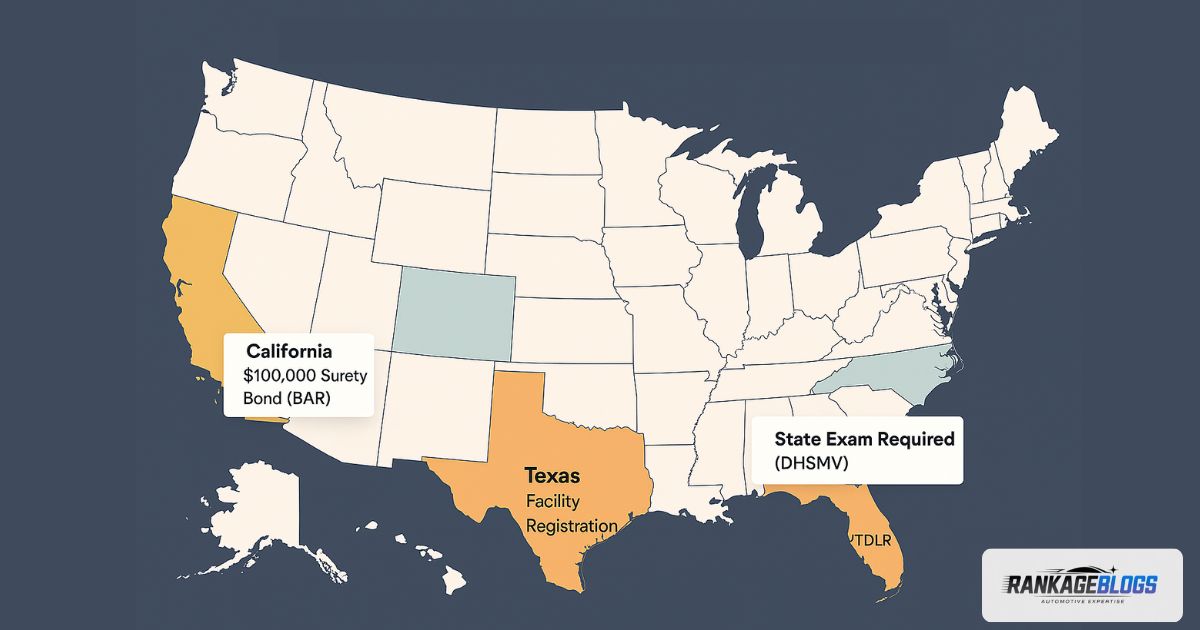
- California:Requires a specific “Auto Glass Repair and Replacement” license from the Bureau of Automotive Repair (BAR), with strict advertising compliance for repair shops rules and a $100,000 surety bond
- Florida:Has a dedicated “Auto Glass Installer and Repairer” license under the Department of Highway Safety and Motor Vehicles, requiring proof of insurance and a passing score on a business and law exam.
- Texas:Does not have a specific state-level auto glass license, but shops must register with the Texas Department of Licensing and Regulation (TDLR) as a “Motor Vehicle Repair Facility,” and technicians may need individual registration.
Insurance & Liability Requirements
Adequate insurance coverage for auto glass shop operations isn’t optional — it’s a fundamental pillar of your risk management and legal compliance. Without it, a single accident, lawsuit, or property damage claim could bankrupt your business. This is a core component of auto glass business compliance that directly addresses the financial risks you face daily.
When people ask, “What business insurance is absolutely mandatory vs. just recommended for an auto glass startup?” they are looking for clarity. The “mandatory” list is often dictated by state law and business partners, while the “recommended” policies are what prudent business owners use to sleep soundly at night.
General Liability Insurance (Coverage Minimums)
This is essential. It protects you if a customer is injured on your property or if your work causes property damage. For example, if a technician accidentally scratches a customer’s car paint during a windshield replacement, this policy would cover the repair.
Problem: A customer slips on a wet spot in your waiting area and suffers a serious injury, leading to a lawsuit that seeks hundreds of thousands of dollars in damages.
Solution: Secure a robust commercial general liability insurance policy with a minimum of $1 million in coverage. This transforms a potential business-ending catastrophe into a manageable, insured event. Most insurance companies and landlords will require this.
Workers’ Compensation Insurance
This is legally required in almost every state if you have employees, governed by specific workers’ compensation laws. It covers medical costs and lost wages for technicians who are injured on the job, such as from lifting a heavy windshield or cutting themselves on glass.
Auto Insurance for Mobile Repair Vans
If you operate a mobile service van, a personal auto policy will not suffice. You need a mobile glass repair insurance policy that covers the vehicle, the tools inside, all aspects of how mobile auto glass services work and provides liability coverage while the van is being used for business purposes. These requirements for mobile auto glass vans are critical for compliance.
Problem: Your mobile van is involved in an at-fault accident while driving to a job site. The personal auto insurer denies the claim because the vehicle was being used commercially.
Solution: Purchase a commercial auto policy that explicitly covers your mobile glass repair operations. Ensure the policy includes coverage for the expensive tools and inventory stored inside the vehicle.
Consumer Protection & Warranty Rules
State consumer protection laws are designed to create a fair and transparent marketplace, and auto glass shops are directly in the crosshairs of these regulations. These laws protect consumer rights in auto repair and mandate clear communication. Adhering to these rules isn’t just about avoiding legal trouble—it’s about building a reputation for honesty that will earn you lifelong customers. This is a key area where advertising compliance for repair shops and clear communication are critical.
These rules answer the customer’s question, “What am I legally entitled to?” By proactively meeting these standards, you demonstrate that your shop operates with integrity. This builds the trust necessary to handle insurance claims smoothly and to earn positive word-of-mouth referrals.
Warranty Disclosures
Most states have specific auto glass warranty disclosure laws requiring you to provide a clear, written warranty for your workmanship. This document must specify what is covered, the duration of the coverage, and the steps a customer must take to make a claim. Hiding or obscuring warranty terms is a direct violation of consumer protection laws.
Problem: A customer returns with a leaky windshield installation six months later, claiming you promised a “lifetime warranty” verbally.
Solution: Provide a detailed, written warranty document with every job that ensures complete understanding auto glass warranty coverage for your customers. Have the customer sign an acknowledgment of receipt. This eliminates “he said, she said” disputes and ensures you only honor legitimate, documented claims.
Advertising & Claims Transparency
You cannot make false or misleading claims in your advertising. For instance, if you advertise “OEM (Original Equipment Manufacturer) glass,” you must install exactly that. “Like-OEM” or “OEM-quality” is not the same. Advertising compliance for repair shops also often requires you to display your business or contractor license number in all ads.
Invoicing / Estimate Rules In Certain States
Many states have specific rules for itemized bills. You must provide a detailed, written estimate before beginning work and a final invoice that clearly breaks down the cost of parts (glass, moldings, adhesive) and labor. Insurance claim compliance depends heavily on this transparency.
Problem: An insurance adjuster questions your final bill, disputing the line items and delaying payment.
Solution: Use software to generate hyper-detailed, itemized bills that match the insurance estimate format, which streamlines the process of filing an auto glass insurance claim for your customers. This transparency speeds up reimbursement and demonstrates compliance with service estimate regulations.
Navigating Common Compliance Challenges in Auto Glass Shop Business Regulations
Even with the best intentions, many shop owners struggle with the practical realities of maintaining full compliance. These challenges are the root of countless forum posts and queries from frustrated business owners. Recognizing these hurdles is the first step toward developing effective strategies to overcome them, turning a source of stress into a manageable part of your operations.
The core issue often boils down to resources—both time and money. Small shops, in particular, feel the pinch of the cost of getting all the proper licenses and bonds, which can feel overwhelming at the startup phase. However, viewing these costs as an investment in your business’s stability and growth is a crucial mindset shift.
Cost of Compliance Vs. Small Shop Budgets
Between licensing fees, surety bond premiums, insurance policies, and mandatory equipment, the upfront and ongoing costs are significant. This directly addresses the query, “How much does it REALLY cost to start a small auto glass shop?” The answer must include these often-overlooked legal and compliance expenses, not just the price of a repair kit.
Problem: “The cost of licenses and bonds is killing my startup budget.”
Solution: Factor these costs into your initial business plan. Price your services to include these necessary overheads. A legitimate business can’t compete on price with an unlicensed one — it must compete on trust, quality, and reliability.
Keeping Up With Changing State/Federal Laws
Regulations are not static. New 2025 industry regulations or updates to OSHA workplace safety protocols can be easy to miss. A regulation that was valid last year might already be outdated today, creating a constant need for vigilance and continuing education.
Problem: You’re unaware of a new state record-keeping law and fail an inspection.
Solution: Subscribe to newsletters from your state’s regulatory body and national associations like the Auto Glass Safety Council (AGSC). Schedule a quarterly “compliance review” to audit your processes against the latest rules.
Record-Keeping & Paperwork Issues
The question “What kind of records am I legally required to keep for my auto glass repair customers?” is a common one. The answer is often extensive and dictated by the auto glass record keeping law: work orders, itemized bills, customer authorizations, proof of part purchases (with DOT approved glass markings), and warranty documents. These auto glass documentation requirements are a leading cause of failed state audits if mismanaged.
Problem: You waste hours every week managing filing cabinets and struggle to find documents during an audit.
Solution: Implement digital record management tools immediately. Use a cloud-based system to store all job documents, making them easily searchable and accessible from anywhere. This is a non-negotiable efficiency for the modern shop.
Best Practices For Staying Compliant In 2025
Proactive compliance is far more efficient — and less costly — than scrambling to fix violations after they occur. By building a system for adherence into your daily operations, following these auto glass compliance guidelines, you can reduce stress, avoid penalties, and position your shop as an industry leader. The goal is to make compliance a seamless part of your workflow, not a periodic panic.
The most successful shops leverage technology and continuous education to stay ahead of the curve. They don’t just meet the minimum standards; they exceed them, using their superior compliance posture as a key marketing point when dealing with insurance companies and commercial clients.
The Monthly Compliance Health Check
- Review Paperwork:Audit a random sample of last month’s work orders to ensure itemized bills and customer authorizations are complete.
- Verify Credentials:Check that all technician certifications are current and that training logs are up-to-date. Ensure you are hiring and retaining qualified technicians.
- Check for Updates:Spend 30 minutes researching any new state or federal regulatory changes.
- Inspect the Shop:Do a walk-through to ensure OSHA workplace safety standards are being met (e.g., PPE usage, chemical storage).
Training Staff Regularly
Your technicians are on the front lines of your compliance efforts. Conduct regular compliance training sessions for staff on the latest NHTSA glass regulations, OSHA workplace safety for glass technicians protocols, and your own shop’s quality control procedures are essential. Investing in how to get certified for auto glass repair for your team (e.g., through AGRSS or ASE) is a powerful way to demonstrate commitment.
Partnering With Compliance Consultants
For complex issues, especially when expanding into new states, hiring a consultant who specializes in auto glass business compliance can be a wise investment. They can help you navigate the specific state business permit process and avoid costly missteps.
Using Digital Tools for Record Management
Modern compliance management software is a game-changer. These digital record management tools can automatically generate compliant work orders and itemized bills, track customer warranties, integrate with AI-powered damage detection in auto glass repair and securely store all necessary documents, making state inspections a breeze rather than a nightmare.
Conclusion
Ultimately, viewing auto glass shop business regulations as a growth enabler is the key to long-term success. These rules are not designed to hinder you but to create a level playing field where quality, safety, and professionalism are rewarded. A strong compliance framework protects you from catastrophic risk and builds the trust that attracts premium clients and lucrative insurance partnerships.
Your commitment to understanding and implementing these auto glass compliance guidelines will set your business apart from the competition by meeting all the criteria that customers use in how to choose the best auto glass service provider. To dive deeper into specific areas, explore our dedicated cluster guides on [State-Specific Auto Glass Licensing Requirements], [Insurance Strategies for Auto Glass Shops], [Hazardous Waste Disposal for Automotive Businesses], and the critical role of [ADAS Calibration Laws and Best Practices].
Ready to take the next step? [Download our Free Auto Glass Shop Compliance Checklist] to ensure you never miss a critical step in maintaining your legal standing and building a reputable business.
People Also Ask (FAQs)
Q: How to open an auto glass shop?
A: Start by creating a business plan, choosing an LLC or sole proprietorship structure, securing the necessary state and local business licenses, and obtaining liability insurance and a surety bond.
Q: Is auto glass business profitable?
A: Yes, with steady demand from insurance claims and road damage, an auto glass shop can be profitable, especially for owners who efficiently manage overhead and build relationships with insurance providers.
Q: What permits do I need to open an auto glass shop?
A: You’ll typically need a general business license, a specific motor vehicle repair or auto glass license from your state, a surety bond, and potentially local zoning and environmental permits for waste disposal.
Q: What is the business code for auto glass?
A: The common NAICS code for an auto glass shop is 811121 – Automotive Glass Replacement Shops, which is used for tax classification and business registration.
Q: Is auto glass a good business?
A: Yes, it’s a recession-resistant service business with consistent demand, though success depends on your location, competition, and ability to navigate insurance industry partnerships and regulations.
Q: What are the auto glass shop business regulations in Texas?
A: Texas requires registration as a “Motor Vehicle Repair Facility” with the TDLR, a surety bond, and general liability insurance, but no specific state-level auto glass license.
Q: What are the auto glass shop business regulations in Georgia?
A: Georgia mandates a “Motor Vehicle Repair Shop” license from the State Board of Registration, which includes auto glass businesses and requires a surety bond.
Q: What are the auto glass shop business regulations in Florida?
A: Florida requires a dedicated “Auto Glass Installer and Repairer” license from the DHSMV, involving an exam, proof of insurance, and a surety bond.
H3: Q: What are the auto glass shop business regulations in California?
A: California has strict rules, requiring a specific “Auto Glass Repair and Replacement” license from the BAR, strict advertising compliance, and a $100,000 surety bond.

